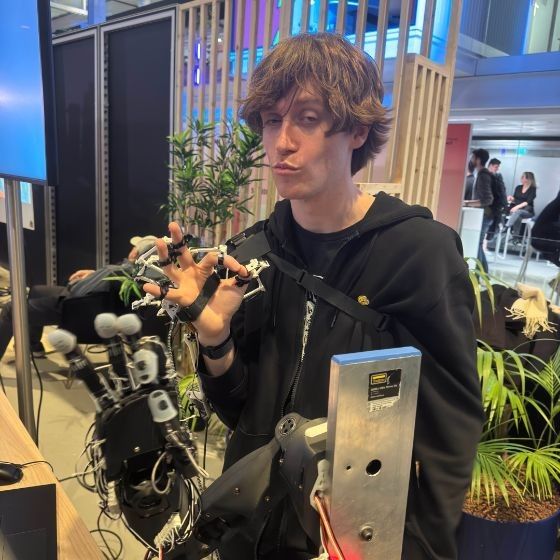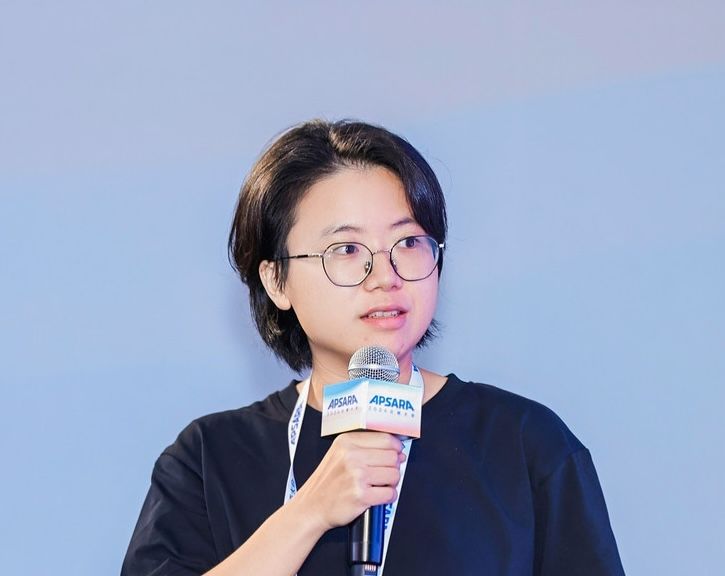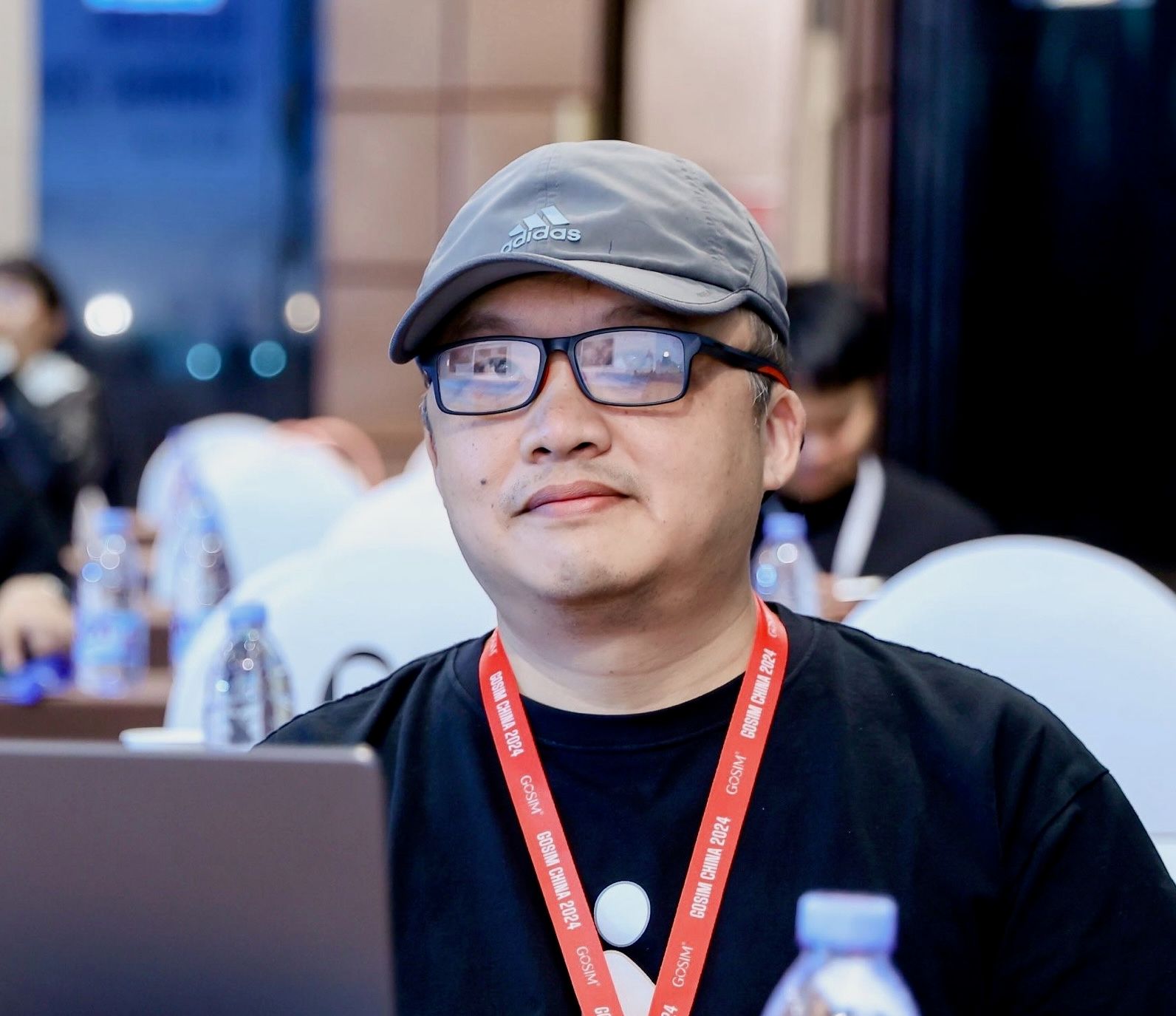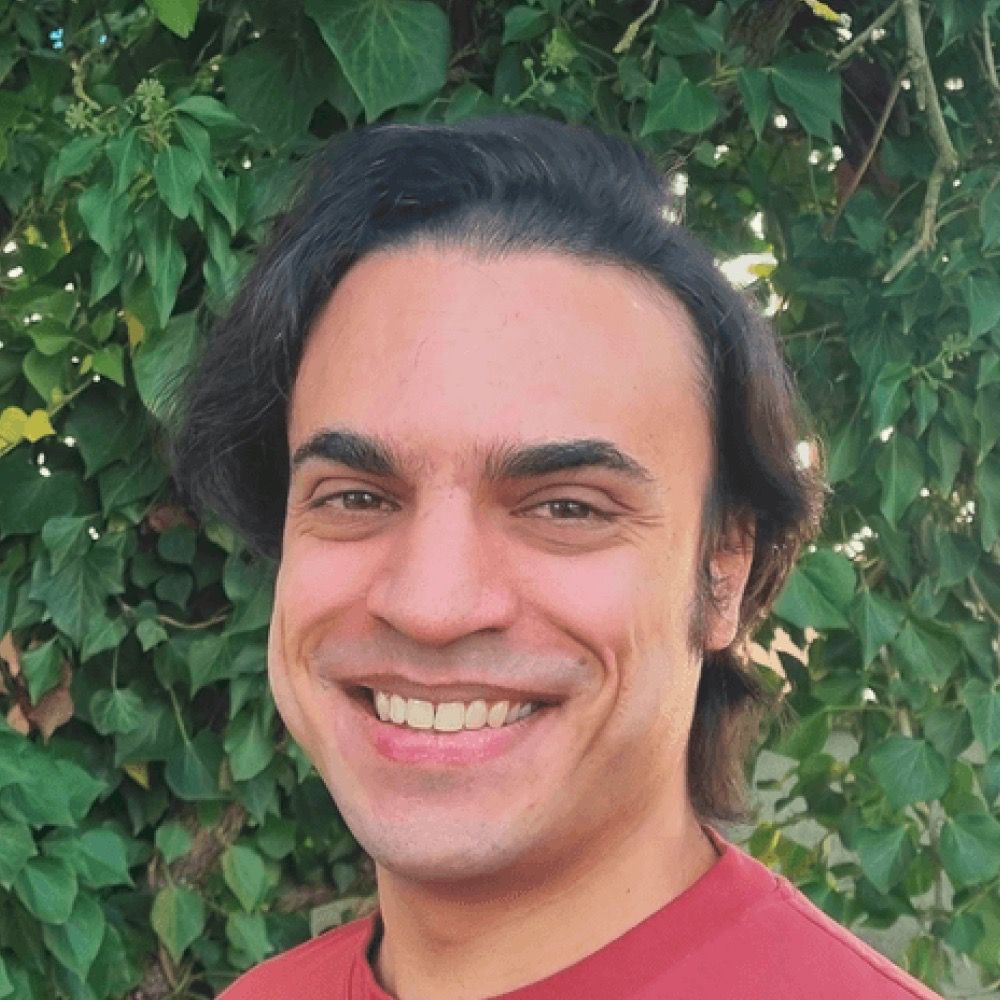Schedule: May 7
Filter:
-
May 7
8:30 - 9:30
Breakfast and Registration
All TracksEntrance Lobby
Check-In and Badge Pickup -
May 7
9:30 - 9:45
Keynote: The Era of Open Experience
All TracksMaster Stage
DeepSeek R1 signals a significant turning point of LLM research and development, where more new architecture improvements utilised in pre-training and a brand new RL flywheel in post-training that desires the power of open source. In this talk we will first introduce LF AI & Data Foundation, then walk through six directions and trends of LLM research and finally we present a proposal of building open source ecosystem for reinforcement learning with generalised reward in a new era of open experience -
May 7
9:45 - 10:00
Keynote: Unlocking AI’s Full Potential: How Open Source and Open Standards Will Shape the Future of Intelligent Systems
All TracksMaster Stage
Artificial intelligence is advancing at an unprecedented pace—but without a foundation rooted in openness, its future risks being fragmented, inaccessible, and unsustainable. In this keynote, Matt White, Executive Director of the PyTorch Foundation and General Manager of AI at the Linux Foundation, will explore why the convergence of open source and open standards is not just beneficial, but essential to AI’s long-term success. Drawing on lessons from the evolution of PyTorch and the broader open ecosystem, Matt will examine how collaborative frameworks, interoperable tooling, and transparent governance can drive innovation while ensuring trust, scalability, and global accessibility. Attendees will gain strategic insights into building responsible AI systems—and why openness must be at the core. -
May 7
10:00 - 10:30
Morning Coffee
All TracksOpen Platform
Coffee & hors d’oeuvres -
May 7
10:30 - 11:10
Multilingualism of Qwen: From Foundation Model to Applications
AI ModelMaster Stage
Multilingual and cross-lingual capabilities significantly boost the flexibility and usefulness of large language models (LLMs). Using Qwen as an example, we'll explore methods to enhance multilingual performance in LLMs, including pre-training, post-training, and evaluation strategies. Additionally, we'll examine the real-world applications of these advancements, demonstrating how multilingual capabilities can create practical solutions that overcome language barriers and promote smooth communication. -
May 7
10:30 - 11:10
Streamlining AI App Development with Docker: Models and AI Tools That Just Work
AI InfraFounders Café (Updated)
Discover how Docker’s Model Runner enables fast, local AI inference with GPU support, and how the Docker makes it easy to integrate LLMs and agents using MCP —no complex setup required. -
May 7
10:30 - 11:10
OAKS: The Open Agentic AI Knowledge Stack
AI AppsOpen Stage
In this talk, we present an OSS AI architecture for Agentic AI+Knowledge. Encapsulating business knowledge is key for agents, and focusing on AI memory and scalable frameworks around Knowledge Graphs is a good foundation to build an OSS AI ecosystem for agents. -
May 7
10:30 - 11:10
How to Build Your Humanoid
Embodied AIJunior Stage
In 2021, desperate need for human connection led me to the creation of a 16-DOF data glove. Open-sourcing it made the glove find its way to Rob Knight, creator of the 16-DOF DexHand, who had just begun developing a humanoid with Rémi Cadène's LeRobot. -
May 7
10:30 - 10:50
Welcome & Opening Remarks
PyTorch Day FranceCentral Room (Updated)
-
May 7
10:50 - 11:10
Real-World Robotics as the Next Frontier for AI?
PyTorch Day FranceCentral Room (Updated)
As AI continues to push the boundaries of perception and decision-making, robotics emerges as one of its most exciting and demanding playground. In this talk, we’ll explore how the intersection of machine learning and robotics opens up powerful avenues for interaction, manipulation, and embodied intelligence. We will emphasize the critical role of real-world experimentation and data collection in bridging the gap between simulation and deployment. Interestingly, tasks traditionally viewed as complex, like locomotion, have seen significant progress, while seemingly simple behaviors—such as dexterous manipulation—remain open challenges. By grounding AI systems in physical environments, we gain deeper insight into their capabilities and limitations, and identify new directions for research at the intersection of learning, control, and embodiment. -
May 7
11:10 - 11:50
Open Foundation Models: Scaling Laws and Generalization
AI ModelMaster Stage
To study transferable learning and generalization, derivation of reproducible scaling laws is crucial. We highlight why open foundation models and datasets are essential for this research and highlight challenges in properly measuring generalization. -
May 7
11:10 - 11:50
Data Spaces as the Backbone for an AI Dataverse
AI InfraFounders Café (Updated)
A sound ecosystem of AI, LLMs, and Agentic AI is essential for the AI and Data economy. This ecosystem requires an additional layer of trust to connect data and infrastructures through marketplaces and guarantee data governance and usage control, among other things. This is necessary to meet the diverse data requirements in the EU, including the GDPR, the Data Act, and the Data Governance Act, among others. Also, the interconnection via self-sovereign identity may allow different partners to add extra trust interactions. This is provided by the data spaces and the trusted data matrix initiates all over the world. In the EUNOMIA project, we are integrating the MCP protocol ( Model Context Protocol ) as a way to feed data from the flourishing European data spaces infrastructure to the LLMs. This could be interconnected, in a trusted way, with different partners via the Gaia-X trust framework, the EIDAS 2 initiative and the self-sovereign identity infrastructure. This could be generalized into the new A2A protocol, presented by Google. In fact, this protocol could be merged with our Advance data space protocol in order to add extra trust capabilities. So this could be a perfect match since the Authentication and authorization for actuation over real systems. This could lead to an architecture of a fully distributed trusted architecture between different actors all over the world that could lead to a Dataverse upon which different applications and services may be automatically deployed that will be introduced. -
May 7
11:10 - 11:50
OpenManus: Empowering LLM-based Agent Applications Via Framework and Capability Evolution
AI AppsOpen Stage
We introduce OpenManus, a lightweight and versatile LLM-based multi-agent framework evolved from MetaGPT, designed to enhance adaptability, autonomy, and scalability through advanced reasoning, planning, and effective cross-environment operation. -
May 7
11:10 - 11:50
G1 Open Source Dataset and Humanoid Robot from Unitree Robotics
Embodied AIJunior Stage
With artificial intelligence technology move very fast in the past two years, humanoid robot have been one of the most import form to realized embodied AI and AGI, Unitree have been working for more than 8 years in leg robot and 1 year in humanoid robot area. There are three most important parts, algorithm, data and computing capability for realized AGI. Those three part will finally running on physical robots, we believe build robust physical humanoid robot system is key for this ecosystem, and World Large-Scale Model (most people called foundation model) is the key to bring Embodied AI for for humanoid robot, we will share the most important progressing have been made on industry and research side in the past one year, and expect and excited for new progressing will happening in next few years soon. In order to promote the development of the global embodied AI industry, the Unitree G1 robot operation data set is open sourced, adapted to a variety of open source solutions, and continuously updated. -
May 7
11:10 - 11:30
TorchCodec: The Media Decoding Library for PyTorch
PyTorch Day FranceCentral Room (Updated)
TorchCodec is a new PyTorch library for decoding video and audio data into tensors, on CPU and CUDA GPU. It aims to be fast, easy to install, easy to use, and well integrated into the PyTorch ecosystem. In this talk, we’ll present the various decoding capabilities of TorchCodec, how to sample video frames, and we’ll describe more advanced use-cases like streaming videos from the cloud. -
May 7
11:30 - 11:50
Scaling LLM Inference with vLLM: Multi‑Accelerator Serving and Quantized LLMs
PyTorch Day FranceCentral Room (Updated)
vLLM has become the community-standard engine for low-latency LLM inference, achieving a 10× increase in usage in 2024 and surpassing 100,000 daily installs by January 2025. Supported by hundreds of contributors and productized through Red Hat AI, vLLM provides a vendor-neutral solution for serving cutting-edge models at scale. This talk outlines a practical blueprint for scaling LLM inference using vLLM, integrating both system-level techniques and model-level optimizations. We begin by addressing the challenges of deploying LLMs with chain-of-thought reasoning in production. Leveraging vLLM’s engine architecture, multi-accelerator deployments using tensor parallelism, paged attention scheduling, and prefill–decode disaggregation demonstrate how a single node can efficiently drive multiple AI accelerators, enhancing throughput without compromising latency. The second optimization layer focuses on quantization. Based on over 500,000 evaluations across language and vision-language models, we examine the accuracy–speed trade-offs of weight and activation quantization. We introduce new pathways that significantly reduce memory usage while maintaining model quality. Attendees will leave with data-driven insights and ready-to-use configurations for deploying state-of-the-art quantized models in scalable enterprise inference pipelines. -
May 7
12:00 - 14:00
Lunch Break
All TracksOpen Platform
Food & drinks -
May 7
12:30 - 13:50
Spotlight Talks Day 2
All TracksJunior Stage
GOSIM AI Spotlight Finalists will present their projects. -
May 7
12:30 -12:45
CodeCarbon: Measuring the Carbon Footprint of Your Servers
GOSIM AI SpotlightOpen Platform
We will see how CodeCarbon works, including the new API and dashboard just released with the third version. -
May 7
12:45 -13:00
Think Small, Act Big: Primitive Prompt Learning for Lifelong Robot Manipulation
GOSIM AI SpotlightOpen Platform
To accelerate continuous skill acquisition through reusable motion-aware primitives, we propose Primitive Prompt Learning (PPL). PPL enables lifelong robot manipulation by optimizing new prompts alongside pretrained ones and demonstrates superior performance in both simulated and real-world tasks. -
May 7
13:00 -13:15
ViDoRAG: Visual Document Retrieval-Augmented Generation Via Dynamic Iterative Reasoning Agents
GOSIM AI SpotlightOpen Platform
Traditional RAG methods face challenges in understanding visually rich documents. We Introduce ViDoSeek dataset and ViDoRAG framework to bridge the gap. -
May 7
13:15 -13:30
LlamaFactory
GOSIM AI SpotlightOpen Platform
LlamaFactory is an easy-to-use and efficient framework for fine-tuning large language models. It can fine-tune hundreds of pre-trained models locally without writing any code. It supports popular models like Llama, Mistral, Qwen, Phi, etc. It streamlines the training process of LLMs from (continuous) pre-training, supervised fine-tuning to RLHF, accompanying with lower costs and better efficiency. By integrating GPTQ quantization and LoRA method, it can fine-tune a 30B model on a single RTX4090 GPU. It further supports flash attention and vLLM to accelerate the training and inference of LLMs. -
May 7
13:30 -13:45
MoFA, Everything Agent
GOSIM AI SpotlightOpen Platform
MoFA (Modular Framework for Agent) is a software framework designed to build AI agents through a composition-based approach. MoFA stands out in several key ways: Empowering Ordinary People to Do Extraordinary Things: AI should not be the exclusive domain of elites and large corporations. MoFA empowers everyone to harness and develop AI, turning the impossible into possible and enabling ordinary people to create extraordinary outcomes. A Fundamental Approach of Composition: Inspired by the Unix philosophy, MoFA centers "composition" as its core principle. You can build agents, connect them, and integrate tools like building blocks, making AI simple, flexible, and powerful. The Unified System of Everything Agent: In MoFA, an agent is not just a large language model—it can be code, scripts, APIs, or even MoFA itself. MoFA is more than a framework; it is an entire agent ecosystem, where the agent is the application of the AI era. Data Flow Over Workflow in Architecture: While most agent frameworks rely on complex and stateful workflows, MoFA adopts a data-driven dataflow approach. This design allows agents to be easily combined, disassembled, and reused, offering greater flexibility and efficiency, relatively more friendly to debug, especially when there are hundreds of agents interacting with each other in a system. -
May 7
14:00 - 14:40
LUCIE : From Scratch with Love !
AI ModelMaster Stage
LUCIE-7B is one of the first large language models that’s truly open, from training code to dataset. This talk shares how we built it using 512 GPUs, a multilingual tokenizer, and public data. We explain the challenges, the lessons, and the reasons behind our open approach. OpenLLM France is building a European AI ecosystem based on transparency and trust. In 2025, we’ll push further: larger models, multimodality, and on-device AI for all. -
May 7
14:00 - 14:40
Kubetorch: A Modern Kubernetes-Native Approach to ML Execution and Production
AI InfraFounders Café (Updated)
Mature organizations run ML workloads on Kubernetes, but implementations vary widely, and ML engineers rarely enjoy the streamlined development and deployment experiences that platform engineering teams provide for software engineers. Making small changes takes an hour to test and moving from research to production frequently takes multiple weeks – these unergonomic and inefficient processes are unthinkable for software, but standard in ML. Kubetorch is an introduction of a novel compute platform that is Kubernetes-native that offers a great, iterable, and debuggable interface into powerful compute for developers, without introducing new pitfalls of brittle infrastructure or long deployment times. -
May 7
14:00 - 14:40
Rethinking the Open Source Agent Stack with Kagent
AI AppsOpen Stage
AI agents offer incredible promise, but are difficult to operationalize. Kagent delivers the full Kubernetes-native stack needed—beyond just a framework—to build, deploy, manage robust agents declaratively & reliably at scale. -
May 7
14:00 - 14:40
Designing Emotions for Robots
Embodied AIJunior Stage
What happens when a robot starts to feel? We connected a language model to Reachy 2 and explored how speech can turn into emotion through gestures, sounds, and expressions. A first step toward artificial empathy in human-robot interaction. -
May 7
14:00 - 14:20
Llama 4
PyTorch Day FranceCentral Room (Updated)
This presentation explores the development of Llama 4, a state-of-the-art foundation model designed to excel in various tasks. We will discuss its key features, including long=context and multimodal understanding. We will also examine Llama 4's potential uses in agentic settings, such as autonomous decision-making and human-AI collaboration, through real-world examples and case studies. -
May 7
14:20 - 14:40
Harnessing Common Crawl for AI and ML applications
PyTorch Day FranceCentral Room (Updated)
This presentation looks at effective strategies for using Common Crawl's web archive in large-scale research applications, specifically for AI and other ML applications. We will discuss practical approaches to processing and filtering Common Crawl’s datasets, with focus on how to overcome computational challenges and optimise data pipelines. We will also discuss some of the challenges that users might encounter related to the multilingual and heterogeneous nature of Common Crawl’s data. The talk will cover best practices for data filtering, pre-processing, and storage, to ensure the quality and relevance of extracted information for research tasks. Additionally, we will briefly discuss the ranking mechanism used to determine whether a URL is crawled, and demonstrate how to use the Web Graph as a framework for further research. -
May 7
14:40 - 15:20
Demysifying LLM Training --- Towards Fully Open-source LLM from Pre-training to Reinforcement Learning
AI ModelMaster Stage
Recently, Large Language Models (LLMs) have undergone a significant transformation, marked by a rapid rise in both their popularity and capabilities. Leading this evolution are proprietary LLMs like GPT-4 and GPT-o1, which have captured widespread attention in the AI community for their power and versatility. Simultaneously, open-source LLMs, such as LLaMA and Mistral, have made great contributions to the ever-increasing popularity of LLMs due to the ease to customize and deploy the models across various applications. Although LLMs offer unprecedented opportunities for research and innovation, its commercialization has raised concerns about transparency, reproducibility, and safety. Many open LLM models lack the necessary components (such as training code and data) for full understanding and reproducibility, and some use restrictive licenses whilst claiming to be “open-source”, which may hinder further innovations on LLMs. To mitigate this issue, we follow the Model Openness Framework (MOF), a ranked classification system that rates machine learning models based on their completeness and openness, following principles of open science, open source, open data, and open access. We present a truly open source LLM Moxin 7B and release pre-training code and configurations, training and fine-tuning data, and intermediate and final checkpoints, aiming to make continuous commitments to fully open-source LLMs. We also finetune the Moxin Base model with SOTA post-training framework and instruction data to obtain Moxin Instruct model. To improve the reasoning capability, we further finetune our model with chain-of-thought data distilled from DeepSeek R1, and then use Group Relative Policy Optimization, an efficient and effective reinforcement learning algorithm following DeepSeek R1, to finetune our model, leading to the Moxin Reasoning model. -
May 7
14:40 - 15:20
RAGFlow: Leading the Open-Source Revolution in Enterprise-Grade Retrieval-Augmented Generation
AI InfraFounders Café (Updated)
RAGFlow tackles core RAG challenges—data quality, semantic gaps, low hit rates—with open-source solutions. This talk demonstrates enhanced retrieval, reasoning, and multimodal capabilities for robust enterprise AI applications. -
May 7
14:40 - 15:20
Finding the Scaling Law of Agents
AI AppsOpen Stage
This talk explores the potential of building scalable techniques to facilitate autonomous cooperation among communicative agents. To address the challenges of achieving autonomous cooperation, we propose a novel communicative agent framework named CAMEL. We showcase how role-playing can be used to generate conversational data for studying the behaviors and capabilities of a society of agents. In particular, we conduct comprehensive studies on cooperation in multi-agent settings. Our contributions include introducing a novel communicative agent framework, offering a scalable approach for studying the cooperative behaviors and capabilities of multi-agent systems, and open-sourcing our library to support research on communicative agents and beyond: https://github.com/camel-ai/camel. -
May 7
14:40 - 15:20
Learning from Human Demonstrations: A New Paradigm for Scalable Robot Data Acquisition
Embodied AIJunior Stage
Acquiring diverse and large-scale real-world robot data remains a critical bottleneck in training generalizable robotic action models. Efficient and scalable data collection has thus emerged as a key research focus in robotics. A widely used method is teleoperation, where humans either wear VR devices or operate a secondary robot to guide actions. While effective, these approaches are limited by hardware-specific constraints and require complex setups, hindering scalability. An emerging alternative is to learn directly from human demonstrations without relying on teleoperation hardware. This paradigm allows robots to acquire task-relevant motion data by observing or interpreting natural human movements, offering a more flexible and hardware-agnostic solution. In this talk, I will introduce a novel framework for robot data acquisition from human demonstrations. I will detail how it bypasses traditional teleoperation limitations and enables scalable learning across varied tasks and environments. By bridging the gap between human intent and robot execution, this method opens a promising direction for general-purpose robotic learning in the real world. -
May 7
14:40 - 15:00
The Ultra-Scale Talk: Scaling Training to Thousands of GPUs
PyTorch Day FranceCentral Room (Updated)
Training large language models (LLMs) demands more than just raw compute—it requires infrastructure, strategy, and a deep understanding of parallelism. What begins as a single-GPU prototype must eventually scale across thousands of devices, each step introducing new complexity. This talk dives into the practicalities of ultra-scale training. We'll explore how 5D parallelism—spanning data, tensor, pipeline, context, and expert dimensions—makes it possible to stretch a single training run across massive GPU clusters. Along the way, we’ll cover performance tuning, communication patterns, and architecture choices that impact throughput and hardware efficiency. A key reference for this session is the Ultra-Scale Playbook, which distills best practices and hard-earned lessons from real-world LLM scaling efforts. We’ll walk through highlights of the playbook, tying them into case studies, benchmarks, and hands-on recommendations. Scaling isn’t just about size—it’s about doing more with what you have. This webinar offers a comprehensive look at what it really takes to train state-of-the-art models at scale, designed for engineers, researchers, and practitioners ready to move beyond “it fits on one GPU” toward infrastructure that powers trillion-parameter models—efficiently, and at speed. -
May 7
15:00 - 15:20
Teaching Mistral to Reason: Post-Training with PyTorch and NVIDIA
PyTorch Day FranceCentral Room (Updated)
Post-training techniques have become essential as demand for Reasoning AI systems explodes. This talk provides a practical overview of how to enhance the reasoning capabilities of open-weight models—using Mistral as a working example. We’ll explore the full pipeline: sourcing high-quality reasoning datasets, selecting the right model checkpoints, and using tools that extend the functionality of PyTorch like NVIDIA NeMo and TensorRT-LLM. Whether you’re working on chatbots, agents, or task-specific models, you’ll leave with a clear understanding of the tools and workflows to take advantage of open models. -
May 7
15:20 - 15:40
Afternoon Coffee
All TracksOpen Platform
Coffee & hors d’oeuvres -
May 7
15:40 - 16:20
Small but Mighty: How MiniCPM Made Breakthroughs in the Global Open-Source AI Landscape
AI ModelMaster Stage
MiniCPM, nicknamed 'ModelBest's Little Steel Cannon'—which includes the large language model MiniCPM and the multimodal large model MiniCPM-V—has gained widespread recognition in the global AI community due to its highly efficient and cost-effective nature, embodying the principle of 'punching above its weight' These projects have cumulatively received over 26,000 stars on GitHub, with total downloads exceeding 7 million across the web, becoming benchmark works in the field of on-device AI. -
May 7
15:40 - 16:20
Khronos in the World of Open Source and Machine Learning
AI InfraFounders Café (Updated)
Discover the Khronos Group's vital role at the intersection of machine learning, open source, and open standards. Learn how Khronos, an open, non-profit, member-driven consortium, creates royalty-free standards for compute, graphics, ML, and more, fosters innovation and interoperability. This talk explores Khronos's use of open source principles and highlights key Khronos APIs accelerating ML, including OpenCL, SYCL, OpenVX with NNEF, and the increasingly important Vulkan API for high-performance inference and cross-platform deployment. Join this session for insights into how Khronos standards and open source collaboration are shaping the future of hardware-accelerated machine learning. -
May 7
15:40 - 16:20
Database for Agents Memory, The Right Way
AI AppsOpen Stage
In this session, we will explore best practices for leveraging serverless SQL databases to support the sophisticated memory requirements of AI agents. We will delve into essential technical requirements, including schema design considerations, efficient indexing strategies, consistency vs. availability trade-offs, handling real-time updates, and seamless integration with AI workflows. Additionally, we'll discuss common pitfalls, performance optimization techniques, and how to achieve cost-efficiency without sacrificing responsiveness or data integrity. Attendees will gain actionable insights into architecting robust, scalable memory storage solutions that enhance the capability, adaptability, and overall effectiveness of AI agents in production environments. -
May 7
15:40 - 16:20
AI Empowers IoT Devices to Drive the Dual Engines of Industrial Transformation
Embodied AIJunior Stage
Amidst the contemporary surge of digital transformation, the symbiotic convergence of artificial intelligence (AI) and IoT devices has emerged as a pivotal catalyst for industrial evolution. AI's infusion of autonomous learning, intelligent decision-making, and seamless interaction capabilities into intelligent hardware has redefined the paradigm, elevating conventional tools to the status of sophisticated, intelligent collaborators. This technological metamorphosis is evident across a spectrum of applications, from the bespoke experiences delivered by smart home ecosystems to the pinpoint precision of operations within industrial automation frameworks. The ramifications of this fusion extend beyond mere enhancement; it has become a driving force propelling the digital reinvention of traditional industries and the emergence of new sectors. In this presentation, we will delve into the intricate dynamics of the integration trends between AI and IoT devices, explore groundbreaking technological innovations, examine a diverse array of application scenarios, and assess the profound and far-reaching impacts on industrial transformation. By doing so, we aim to peer into the future, where the potential for growth and innovation is boundless, and to chart a course that offers novel insights and strategic directions for the continued advancement of our industry. -
May 7
15:40 - 16:00
DeepSpeed – Efficient Training Scalability for Deep Learning Models
PyTorch Day FranceCentral Room (Updated)
Deep Learning (DL) is driving unprecedented progress across Artificial Intelligence domains, including natural language processing, vision, speech, and multimodal. Sustaining this rapid pace of AI revolution, however, requires practical solutions to the extreme demands of scaling on the compute, memory, communication, and storage components of modern computing hardware. To address this challenge, we created a deep learning optimization library called DeepSpeed to make distributed model training efficient, effective, and easy on commodity hardware. This talk will focus on DeepSpeed optimizations for improving compute, communication, and I/O of extreme-scale model training. -
May 7
16:00 - 16:20
Advancing Mamba in PyTorch
PyTorch Day FranceCentral Room (Updated)
Mamba layers are efficient alternatives to standard attention: their training complexity is linear in sequence length, while inference is sequence-length-independent and only requires a small cache. I will discuss a selection of IBM's ongoing work in advancing the state of mamba training in pytorch, including: context-parallel training for long-sequence data, mamba + mixture-of-expert support with expert parallelism, torch-native associative scan ops, and improved DTensor op support. -
May 7
16:20 - 17:00
Pre-training of Smol and Large LLM
AI ModelMaster Stage
Explaining what's new in pre-training: optimization tricks, MoE, stability hacks, and handling long contexts—everything you need to build better LLMs. -
May 7
16:20 - 17:00
WGML: the Story of Building a New High-performance, Cross-platform, On-device Inference Framework.
AI InfraFounders Café (Updated)
Ever dreamed of writing a new low-level LLM inference library? Check out the making of WGML, an open-source high-performance cross-platform GPU inference framework using Rust and WebGPU. We will cover tips for discovering and implementing LLM inference. -
May 7
16:20 - 17:00
Agentic Search
AI AppsOpen Stage
The talk covers basic concepts and use-cases of agentic search. -
May 7
16:20 - 17:00
Towards a Cerebrum-Cerebellum Collaboration Framework for Large Embodied Models
Embodied AIJunior Stage
Recent advances in large-scale multimodal models have significantly enhanced embodied AI systems, enabling more natural and adaptive interactions with the physical world. However, current models and frameworks often struggle with spatial-temporal perception, real-time and precise collabration. Inspired by the biological synergy between the cerebrum and cerebellum, we propose a novel collaboration framework that integrates high-level cognitive reasoning with fast, low-latency sensorimotor adaptations. This talk explores how this framework can improve planning, error correction, and robustness in embodied AI. We will discuss model architectures, training strategies, and applications in robotic manipulation and human-robot interaction, paving the way for more agile and intelligent embodied systems. -
May 7
16:20 - 16:40
Lightning Thunder: Supercharged PyTorch for Modern Hardware
PyTorch Day FranceCentral Room (Updated)
Modern GPUs like Hopper and Blackwell are fast, but only after careful optimization. Lightning Thunder compiles “education-style” PyTorch models into optimized, distributed PyTorch code. Through a composable plugin system, Lightning Thunder lets developers layer in kernel fusion, low-precision operations, memory optimizations, and flexible parallelism strategies, to achieve performance and scale while leaving the original PyTorch code unchanged. This talk will cover how Lightning Thunder bridges the gap between ease-of-use and peak performance, and enables teams to easily write custom code transformations to scale models efficiently, reduce GPU waste, and stay in control of their stack. -
May 7
16:40 - 17:00
Beat GPT 4 and Build the Best AI For You: Mobilizing First-Party Data with Fine-Tuning
PyTorch Day FranceCentral Room (Updated)
In late 2022, there was an alluring promise that large models can do everything - just prompt a sufficiently large model to solve your AI problem. But after two years of GenAI experimentation, it's clear that even the largest models still fall short for many use cases on quality, speed, cost, or reliability. Enter fine-tuning, small language models, automatic distillation, and continuous feedback loops that propagate behavior into the models. In this talk, we'll give a concrete framework for thinking about fine-tuning and when it's necessary. Then, we will show how combining modern open-source fine-tuning libraries has made fine-tuning more accessible than ever before and the platform that we can create to enable it. -
May 7
17:00 - 18:00
Spotlight Demos
All Tracks -
May 7
17:00 - 17:20
Best Practices for Open Multilingual LLM Evaluation
PyTorch Day FranceCentral Room (Updated)
Multilingual language models seem to be getting better, but how do we know? In general, language model evaluation is made more uncertain by automatic evaluations which correlate poorly with human ratings, low-quality datasets, and a lack of reproducibility. But for languages other than high-resource languages like English and Mandarin Chinese, these problems are even more consequential. We provide a set of best practices for using existing evaluations. Given the limited number of evaluations for many languages, we highlight languages and tasks that need more benchmarks and outline key considerations for developing new multilingual benchmarks. -
May 7
17:20 - 17:40
Multimodal Open Source at Kyutai, From Online Demos to On-Device
PyTorch Day FranceCentral Room (Updated)
Kyutai is a leading lab for open science and open source research in Paris. During this session, we dive in some of our recent open source releases, from hosted demos to model running streaming on device, covering multilingual LLM, vision-speech models, simultaneous interpretation and more. We will discuss the challenges arising from supporting a large number of applications and inference platform, with and without PyTorch. -
May 7
17:40 - 18:00
PyTorch x Transformers journey: pythonicity, autodiff and modularity defining modern AI
PyTorch Day FranceCentral Room (Updated)
The HuggingFace Transformers library is a flagship example of what makes PyTorch special: a dynamic, readable, and hackable framework that scales from quick experiments to production-ready architectures. It began as an implementation of BERT, continued to a ""one model, one file"" setup—ideal for iteration—and grew into a modular codebase now defining 315+ models. Transformers has become a reference implementation for the field: a source of truth for model architectures, behaviors, and pretraining conventions. Its evolution reflects PyTorch’s own: grounded in Pythonic values, but pragmatic enough to diverge when needed. PyTorch’s ecosystem has replaced entire toolchains. Scaling models has become simpler: torch.compile brings compiler-level speedups with minimal code changes, and new abstractions like DTensor offer serious performance gains without the low-level complexity. Both PyTorch and Transformers inherit Python’s spirit—clarity, flexibility, expressiveness—without being bound by it. PyTorch leans on ATen and C++ kernels under the hood; Transformers increasingly rely on optimized community kernels and hardware-aware implementations from the hub. Modularity and readability didn’t just improve maintainability—they grew the community. Lowering the barrier to entry encourages experimentation, contributions, and faster innovation. This talk tracks that journey—from how PyTorch enabled Transformers, to how the virtuous cycle of design, performance, and pragmatism continues to shape the tools driving modern AI.
-
May 7
8:30 - 9:30
Breakfast and Registration
All TracksEntrance Lobby
Check-In and Badge Pickup -
May 7
9:30 - 9:45
Keynote: The Era of Open Experience
All TracksMaster Stage
DeepSeek R1 signals a significant turning point of LLM research and development, where more new architecture improvements utilised in pre-training and a brand new RL flywheel in post-training that desires the power of open source. In this talk we will first introduce LF AI & Data Foundation, then walk through six directions and trends of LLM research and finally we present a proposal of building open source ecosystem for reinforcement learning with generalised reward in a new era of open experience -
May 7
9:45 - 10:00
Keynote: Unlocking AI’s Full Potential: How Open Source and Open Standards Will Shape the Future of Intelligent Systems
All TracksMaster Stage
Artificial intelligence is advancing at an unprecedented pace—but without a foundation rooted in openness, its future risks being fragmented, inaccessible, and unsustainable. In this keynote, Matt White, Executive Director of the PyTorch Foundation and General Manager of AI at the Linux Foundation, will explore why the convergence of open source and open standards is not just beneficial, but essential to AI’s long-term success. Drawing on lessons from the evolution of PyTorch and the broader open ecosystem, Matt will examine how collaborative frameworks, interoperable tooling, and transparent governance can drive innovation while ensuring trust, scalability, and global accessibility. Attendees will gain strategic insights into building responsible AI systems—and why openness must be at the core. -
May 7
10:00 - 10:30
Morning Coffee
All TracksOpen Platform
Coffee & hors d’oeuvres -
May 7
10:30 - 11:10
Multilingualism of Qwen: From Foundation Model to Applications
AI ModelMaster Stage
Multilingual and cross-lingual capabilities significantly boost the flexibility and usefulness of large language models (LLMs). Using Qwen as an example, we'll explore methods to enhance multilingual performance in LLMs, including pre-training, post-training, and evaluation strategies. Additionally, we'll examine the real-world applications of these advancements, demonstrating how multilingual capabilities can create practical solutions that overcome language barriers and promote smooth communication. -
May 7
11:10 - 11:50
Open Foundation Models: Scaling Laws and Generalization
AI ModelMaster Stage
To study transferable learning and generalization, derivation of reproducible scaling laws is crucial. We highlight why open foundation models and datasets are essential for this research and highlight challenges in properly measuring generalization. -
May 7
12:00 - 14:00
Lunch Break
All TracksOpen Platform
Food & drinks -
May 7
12:30 - 13:50
Spotlight Talks Day 2
All TracksMaster Stage
GOSIM AI Spotlight Finalists will present their projects. -
May 7
14:00 - 14:40
LUCIE : From Scratch with Love !
AI ModelMaster Stage
LUCIE-7B is one of the first large language models that’s truly open, from training code to dataset. This talk shares how we built it using 512 GPUs, a multilingual tokenizer, and public data. We explain the challenges, the lessons, and the reasons behind our open approach. OpenLLM France is building a European AI ecosystem based on transparency and trust. In 2025, we’ll push further: larger models, multimodality, and on-device AI for all. -
May 7
14:40 - 15:20
Demysifying LLM Training --- Towards Fully Open-source LLM from Pre-training to Reinforcement Learning
AI ModelMaster Stage
Recently, Large Language Models (LLMs) have undergone a significant transformation, marked by a rapid rise in both their popularity and capabilities. Leading this evolution are proprietary LLMs like GPT-4 and GPT-o1, which have captured widespread attention in the AI community for their power and versatility. Simultaneously, open-source LLMs, such as LLaMA and Mistral, have made great contributions to the ever-increasing popularity of LLMs due to the ease to customize and deploy the models across various applications. Although LLMs offer unprecedented opportunities for research and innovation, its commercialization has raised concerns about transparency, reproducibility, and safety. Many open LLM models lack the necessary components (such as training code and data) for full understanding and reproducibility, and some use restrictive licenses whilst claiming to be “open-source”, which may hinder further innovations on LLMs. To mitigate this issue, we follow the Model Openness Framework (MOF), a ranked classification system that rates machine learning models based on their completeness and openness, following principles of open science, open source, open data, and open access. We present a truly open source LLM Moxin 7B and release pre-training code and configurations, training and fine-tuning data, and intermediate and final checkpoints, aiming to make continuous commitments to fully open-source LLMs. We also finetune the Moxin Base model with SOTA post-training framework and instruction data to obtain Moxin Instruct model. To improve the reasoning capability, we further finetune our model with chain-of-thought data distilled from DeepSeek R1, and then use Group Relative Policy Optimization, an efficient and effective reinforcement learning algorithm following DeepSeek R1, to finetune our model, leading to the Moxin Reasoning model. -
May 7
15:20 - 15:40
Afternoon Coffee
All TracksOpen Platform
Coffee & hors d’oeuvres -
May 7
15:40 - 16:20
Small but Mighty: How MiniCPM Made Breakthroughs in the Global Open-Source AI Landscape
AI ModelMaster Stage
MiniCPM, nicknamed 'ModelBest's Little Steel Cannon'—which includes the large language model MiniCPM and the multimodal large model MiniCPM-V—has gained widespread recognition in the global AI community due to its highly efficient and cost-effective nature, embodying the principle of 'punching above its weight' These projects have cumulatively received over 26,000 stars on GitHub, with total downloads exceeding 7 million across the web, becoming benchmark works in the field of on-device AI. -
May 7
16:20 - 17:00
Pre-training of Smol and Large LLM
AI ModelMaster Stage
Explaining what's new in pre-training: optimization tricks, MoE, stability hacks, and handling long contexts—everything you need to build better LLMs. -
May 7
17:00 - 18:00
Spotlight Demos
All Tracks
-
May 7
8:30 - 9:30
Breakfast and Registration
All TracksEntrance Lobby
Check-In and Badge Pickup -
May 7
9:30 - 9:45
Keynote: The Era of Open Experience
All TracksMaster Stage
DeepSeek R1 signals a significant turning point of LLM research and development, where more new architecture improvements utilised in pre-training and a brand new RL flywheel in post-training that desires the power of open source. In this talk we will first introduce LF AI & Data Foundation, then walk through six directions and trends of LLM research and finally we present a proposal of building open source ecosystem for reinforcement learning with generalised reward in a new era of open experience -
May 7
9:45 - 10:00
Keynote: Unlocking AI’s Full Potential: How Open Source and Open Standards Will Shape the Future of Intelligent Systems
All TracksMaster Stage
Artificial intelligence is advancing at an unprecedented pace—but without a foundation rooted in openness, its future risks being fragmented, inaccessible, and unsustainable. In this keynote, Matt White, Executive Director of the PyTorch Foundation and General Manager of AI at the Linux Foundation, will explore why the convergence of open source and open standards is not just beneficial, but essential to AI’s long-term success. Drawing on lessons from the evolution of PyTorch and the broader open ecosystem, Matt will examine how collaborative frameworks, interoperable tooling, and transparent governance can drive innovation while ensuring trust, scalability, and global accessibility. Attendees will gain strategic insights into building responsible AI systems—and why openness must be at the core. -
May 7
10:00 - 10:30
Morning Coffee
All TracksOpen Platform
Coffee & hors d’oeuvres -
May 7
10:30 - 11:10
Streamlining AI App Development with Docker: Models and AI Tools That Just Work
AI InfraFounders Café (Updated)
Discover how Docker’s Model Runner enables fast, local AI inference with GPU support, and how the Docker makes it easy to integrate LLMs and agents using MCP —no complex setup required. -
May 7
11:10 - 11:50
Data Spaces as the Backbone for an AI Dataverse
AI InfraFounders Café (Updated)
A sound ecosystem of AI, LLMs, and Agentic AI is essential for the AI and Data economy. This ecosystem requires an additional layer of trust to connect data and infrastructures through marketplaces and guarantee data governance and usage control, among other things. This is necessary to meet the diverse data requirements in the EU, including the GDPR, the Data Act, and the Data Governance Act, among others. Also, the interconnection via self-sovereign identity may allow different partners to add extra trust interactions. This is provided by the data spaces and the trusted data matrix initiates all over the world. In the EUNOMIA project, we are integrating the MCP protocol ( Model Context Protocol ) as a way to feed data from the flourishing European data spaces infrastructure to the LLMs. This could be interconnected, in a trusted way, with different partners via the Gaia-X trust framework, the EIDAS 2 initiative and the self-sovereign identity infrastructure. This could be generalized into the new A2A protocol, presented by Google. In fact, this protocol could be merged with our Advance data space protocol in order to add extra trust capabilities. So this could be a perfect match since the Authentication and authorization for actuation over real systems. This could lead to an architecture of a fully distributed trusted architecture between different actors all over the world that could lead to a Dataverse upon which different applications and services may be automatically deployed that will be introduced. -
May 7
12:00 - 14:00
Lunch Break
All TracksOpen Platform
Food & drinks -
May 7
12:30 - 13:50
Spotlight Talks Day 2
All TracksFounders Café (Updated)
GOSIM AI Spotlight Finalists will present their projects. -
May 7
14:00 - 14:40
Kubetorch: A Modern Kubernetes-Native Approach to ML Execution and Production
AI InfraFounders Café (Updated)
Mature organizations run ML workloads on Kubernetes, but implementations vary widely, and ML engineers rarely enjoy the streamlined development and deployment experiences that platform engineering teams provide for software engineers. Making small changes takes an hour to test and moving from research to production frequently takes multiple weeks – these unergonomic and inefficient processes are unthinkable for software, but standard in ML. Kubetorch is an introduction of a novel compute platform that is Kubernetes-native that offers a great, iterable, and debuggable interface into powerful compute for developers, without introducing new pitfalls of brittle infrastructure or long deployment times. -
May 7
14:40 - 15:20
RAGFlow: Leading the Open-Source Revolution in Enterprise-Grade Retrieval-Augmented Generation
AI InfraFounders Café (Updated)
RAGFlow tackles core RAG challenges—data quality, semantic gaps, low hit rates—with open-source solutions. This talk demonstrates enhanced retrieval, reasoning, and multimodal capabilities for robust enterprise AI applications. -
May 7
15:20 - 15:40
Afternoon Coffee
All TracksOpen Platform
Coffee & hors d’oeuvres -
May 7
15:40 - 16:20
Khronos in the World of Open Source and Machine Learning
AI InfraFounders Café (Updated)
Discover the Khronos Group's vital role at the intersection of machine learning, open source, and open standards. Learn how Khronos, an open, non-profit, member-driven consortium, creates royalty-free standards for compute, graphics, ML, and more, fosters innovation and interoperability. This talk explores Khronos's use of open source principles and highlights key Khronos APIs accelerating ML, including OpenCL, SYCL, OpenVX with NNEF, and the increasingly important Vulkan API for high-performance inference and cross-platform deployment. Join this session for insights into how Khronos standards and open source collaboration are shaping the future of hardware-accelerated machine learning. -
May 7
16:20 - 17:00
WGML: the Story of Building a New High-performance, Cross-platform, On-device Inference Framework.
AI InfraFounders Café (Updated)
Ever dreamed of writing a new low-level LLM inference library? Check out the making of WGML, an open-source high-performance cross-platform GPU inference framework using Rust and WebGPU. We will cover tips for discovering and implementing LLM inference. -
May 7
17:00 - 18:00
Spotlight Demos
All Tracks
-
May 7
8:30 - 9:30
Breakfast and Registration
All TracksEntrance Lobby
Check-In and Badge Pickup -
May 7
9:30 - 9:45
Keynote: The Era of Open Experience
All TracksMaster Stage
DeepSeek R1 signals a significant turning point of LLM research and development, where more new architecture improvements utilised in pre-training and a brand new RL flywheel in post-training that desires the power of open source. In this talk we will first introduce LF AI & Data Foundation, then walk through six directions and trends of LLM research and finally we present a proposal of building open source ecosystem for reinforcement learning with generalised reward in a new era of open experience -
May 7
9:45 - 10:00
Keynote: Unlocking AI’s Full Potential: How Open Source and Open Standards Will Shape the Future of Intelligent Systems
All TracksMaster Stage
Artificial intelligence is advancing at an unprecedented pace—but without a foundation rooted in openness, its future risks being fragmented, inaccessible, and unsustainable. In this keynote, Matt White, Executive Director of the PyTorch Foundation and General Manager of AI at the Linux Foundation, will explore why the convergence of open source and open standards is not just beneficial, but essential to AI’s long-term success. Drawing on lessons from the evolution of PyTorch and the broader open ecosystem, Matt will examine how collaborative frameworks, interoperable tooling, and transparent governance can drive innovation while ensuring trust, scalability, and global accessibility. Attendees will gain strategic insights into building responsible AI systems—and why openness must be at the core. -
May 7
10:00 - 10:30
Morning Coffee
All TracksOpen Platform
Coffee & hors d’oeuvres -
May 7
10:30 - 11:10
OAKS: The Open Agentic AI Knowledge Stack
AI AppsOpen Stage
In this talk, we present an OSS AI architecture for Agentic AI+Knowledge. Encapsulating business knowledge is key for agents, and focusing on AI memory and scalable frameworks around Knowledge Graphs is a good foundation to build an OSS AI ecosystem for agents. -
May 7
11:10 - 11:50
OpenManus: Empowering LLM-based Agent Applications Via Framework and Capability Evolution
AI AppsOpen Stage
We introduce OpenManus, a lightweight and versatile LLM-based multi-agent framework evolved from MetaGPT, designed to enhance adaptability, autonomy, and scalability through advanced reasoning, planning, and effective cross-environment operation. -
May 7
12:00 - 14:00
Lunch Break
All TracksOpen Platform
Food & drinks -
May 7
12:30 - 13:50
Spotlight Talks Day 2
All TracksOpen Stage
GOSIM AI Spotlight Finalists will present their projects. -
May 7
14:00 - 14:40
Rethinking the Open Source Agent Stack with Kagent
AI AppsOpen Stage
AI agents offer incredible promise, but are difficult to operationalize. Kagent delivers the full Kubernetes-native stack needed—beyond just a framework—to build, deploy, manage robust agents declaratively & reliably at scale. -
May 7
14:40 - 15:20
Finding the Scaling Law of Agents
AI AppsOpen Stage
This talk explores the potential of building scalable techniques to facilitate autonomous cooperation among communicative agents. To address the challenges of achieving autonomous cooperation, we propose a novel communicative agent framework named CAMEL. We showcase how role-playing can be used to generate conversational data for studying the behaviors and capabilities of a society of agents. In particular, we conduct comprehensive studies on cooperation in multi-agent settings. Our contributions include introducing a novel communicative agent framework, offering a scalable approach for studying the cooperative behaviors and capabilities of multi-agent systems, and open-sourcing our library to support research on communicative agents and beyond: https://github.com/camel-ai/camel. -
May 7
15:20 - 15:40
Afternoon Coffee
All TracksOpen Platform
Coffee & hors d’oeuvres -
May 7
15:40 - 16:20
Database for Agents Memory, The Right Way
AI AppsOpen Stage
In this session, we will explore best practices for leveraging serverless SQL databases to support the sophisticated memory requirements of AI agents. We will delve into essential technical requirements, including schema design considerations, efficient indexing strategies, consistency vs. availability trade-offs, handling real-time updates, and seamless integration with AI workflows. Additionally, we'll discuss common pitfalls, performance optimization techniques, and how to achieve cost-efficiency without sacrificing responsiveness or data integrity. Attendees will gain actionable insights into architecting robust, scalable memory storage solutions that enhance the capability, adaptability, and overall effectiveness of AI agents in production environments. -
May 7
16:20 - 17:00
Agentic Search
AI AppsOpen Stage
The talk covers basic concepts and use-cases of agentic search. -
May 7
17:00 - 18:00
Spotlight Demos
All Tracks
-
May 7
8:30 - 9:30
Breakfast and Registration
All TracksEntrance Lobby
Check-In and Badge Pickup -
May 7
9:30 - 9:45
Keynote: The Era of Open Experience
All TracksMaster Stage
DeepSeek R1 signals a significant turning point of LLM research and development, where more new architecture improvements utilised in pre-training and a brand new RL flywheel in post-training that desires the power of open source. In this talk we will first introduce LF AI & Data Foundation, then walk through six directions and trends of LLM research and finally we present a proposal of building open source ecosystem for reinforcement learning with generalised reward in a new era of open experience -
May 7
9:45 - 10:00
Keynote: Unlocking AI’s Full Potential: How Open Source and Open Standards Will Shape the Future of Intelligent Systems
All TracksMaster Stage
Artificial intelligence is advancing at an unprecedented pace—but without a foundation rooted in openness, its future risks being fragmented, inaccessible, and unsustainable. In this keynote, Matt White, Executive Director of the PyTorch Foundation and General Manager of AI at the Linux Foundation, will explore why the convergence of open source and open standards is not just beneficial, but essential to AI’s long-term success. Drawing on lessons from the evolution of PyTorch and the broader open ecosystem, Matt will examine how collaborative frameworks, interoperable tooling, and transparent governance can drive innovation while ensuring trust, scalability, and global accessibility. Attendees will gain strategic insights into building responsible AI systems—and why openness must be at the core. -
May 7
10:00 - 10:30
Morning Coffee
All TracksOpen Platform
Coffee & hors d’oeuvres -
May 7
10:30 - 11:10
How to Build Your Humanoid
Embodied AIJunior Stage
In 2021, desperate need for human connection led me to the creation of a 16-DOF data glove. Open-sourcing it made the glove find its way to Rob Knight, creator of the 16-DOF DexHand, who had just begun developing a humanoid with Rémi Cadène's LeRobot. -
May 7
11:10 - 11:50
G1 Open Source Dataset and Humanoid Robot from Unitree Robotics
Embodied AIJunior Stage
With artificial intelligence technology move very fast in the past two years, humanoid robot have been one of the most import form to realized embodied AI and AGI, Unitree have been working for more than 8 years in leg robot and 1 year in humanoid robot area. There are three most important parts, algorithm, data and computing capability for realized AGI. Those three part will finally running on physical robots, we believe build robust physical humanoid robot system is key for this ecosystem, and World Large-Scale Model (most people called foundation model) is the key to bring Embodied AI for for humanoid robot, we will share the most important progressing have been made on industry and research side in the past one year, and expect and excited for new progressing will happening in next few years soon. In order to promote the development of the global embodied AI industry, the Unitree G1 robot operation data set is open sourced, adapted to a variety of open source solutions, and continuously updated. -
May 7
12:00 - 14:00
Lunch Break
All TracksOpen Platform
Food & drinks -
May 7
12:30 - 13:50
Spotlight Talks Day 2
All TracksJunior Stage
GOSIM AI Spotlight Finalists will present their projects. -
May 7
14:00 - 14:40
Designing Emotions for Robots
Embodied AIJunior Stage
What happens when a robot starts to feel? We connected a language model to Reachy 2 and explored how speech can turn into emotion through gestures, sounds, and expressions. A first step toward artificial empathy in human-robot interaction. -
May 7
14:40 - 15:20
Learning from Human Demonstrations: A New Paradigm for Scalable Robot Data Acquisition
Embodied AIJunior Stage
Acquiring diverse and large-scale real-world robot data remains a critical bottleneck in training generalizable robotic action models. Efficient and scalable data collection has thus emerged as a key research focus in robotics. A widely used method is teleoperation, where humans either wear VR devices or operate a secondary robot to guide actions. While effective, these approaches are limited by hardware-specific constraints and require complex setups, hindering scalability. An emerging alternative is to learn directly from human demonstrations without relying on teleoperation hardware. This paradigm allows robots to acquire task-relevant motion data by observing or interpreting natural human movements, offering a more flexible and hardware-agnostic solution. In this talk, I will introduce a novel framework for robot data acquisition from human demonstrations. I will detail how it bypasses traditional teleoperation limitations and enables scalable learning across varied tasks and environments. By bridging the gap between human intent and robot execution, this method opens a promising direction for general-purpose robotic learning in the real world. -
May 7
15:20 - 15:40
Afternoon Coffee
All TracksOpen Platform
Coffee & hors d’oeuvres -
May 7
15:40 - 16:20
AI Empowers IoT Devices to Drive the Dual Engines of Industrial Transformation
Embodied AIJunior Stage
Amidst the contemporary surge of digital transformation, the symbiotic convergence of artificial intelligence (AI) and IoT devices has emerged as a pivotal catalyst for industrial evolution. AI's infusion of autonomous learning, intelligent decision-making, and seamless interaction capabilities into intelligent hardware has redefined the paradigm, elevating conventional tools to the status of sophisticated, intelligent collaborators. This technological metamorphosis is evident across a spectrum of applications, from the bespoke experiences delivered by smart home ecosystems to the pinpoint precision of operations within industrial automation frameworks. The ramifications of this fusion extend beyond mere enhancement; it has become a driving force propelling the digital reinvention of traditional industries and the emergence of new sectors. In this presentation, we will delve into the intricate dynamics of the integration trends between AI and IoT devices, explore groundbreaking technological innovations, examine a diverse array of application scenarios, and assess the profound and far-reaching impacts on industrial transformation. By doing so, we aim to peer into the future, where the potential for growth and innovation is boundless, and to chart a course that offers novel insights and strategic directions for the continued advancement of our industry. -
May 7
16:20 - 17:00
Towards a Cerebrum-Cerebellum Collaboration Framework for Large Embodied Models
Embodied AIJunior Stage
Recent advances in large-scale multimodal models have significantly enhanced embodied AI systems, enabling more natural and adaptive interactions with the physical world. However, current models and frameworks often struggle with spatial-temporal perception, real-time and precise collabration. Inspired by the biological synergy between the cerebrum and cerebellum, we propose a novel collaboration framework that integrates high-level cognitive reasoning with fast, low-latency sensorimotor adaptations. This talk explores how this framework can improve planning, error correction, and robustness in embodied AI. We will discuss model architectures, training strategies, and applications in robotic manipulation and human-robot interaction, paving the way for more agile and intelligent embodied systems. -
May 7
17:00 - 18:00
Spotlight Demos
All Tracks
-
May 7
8:30 - 9:30
Breakfast and Registration
All TracksEntrance Lobby
Check-In and Badge Pickup -
May 7
9:30 - 9:45
Keynote: The Era of Open Experience
All TracksMaster Stage
DeepSeek R1 signals a significant turning point of LLM research and development, where more new architecture improvements utilised in pre-training and a brand new RL flywheel in post-training that desires the power of open source. In this talk we will first introduce LF AI & Data Foundation, then walk through six directions and trends of LLM research and finally we present a proposal of building open source ecosystem for reinforcement learning with generalised reward in a new era of open experience -
May 7
9:45 - 10:00
Keynote: Unlocking AI’s Full Potential: How Open Source and Open Standards Will Shape the Future of Intelligent Systems
All TracksMaster Stage
Artificial intelligence is advancing at an unprecedented pace—but without a foundation rooted in openness, its future risks being fragmented, inaccessible, and unsustainable. In this keynote, Matt White, Executive Director of the PyTorch Foundation and General Manager of AI at the Linux Foundation, will explore why the convergence of open source and open standards is not just beneficial, but essential to AI’s long-term success. Drawing on lessons from the evolution of PyTorch and the broader open ecosystem, Matt will examine how collaborative frameworks, interoperable tooling, and transparent governance can drive innovation while ensuring trust, scalability, and global accessibility. Attendees will gain strategic insights into building responsible AI systems—and why openness must be at the core. -
May 7
10:00 - 10:30
Morning Coffee
All TracksOpen Platform
Coffee & hors d’oeuvres -
May 7
10:30 - 10:50
Welcome & Opening Remarks
PyTorch Day FranceCentral Room (Updated)
-
May 7
10:50 - 11:10
Real-World Robotics as the Next Frontier for AI?
PyTorch Day FranceCentral Room (Updated)
As AI continues to push the boundaries of perception and decision-making, robotics emerges as one of its most exciting and demanding playground. In this talk, we’ll explore how the intersection of machine learning and robotics opens up powerful avenues for interaction, manipulation, and embodied intelligence. We will emphasize the critical role of real-world experimentation and data collection in bridging the gap between simulation and deployment. Interestingly, tasks traditionally viewed as complex, like locomotion, have seen significant progress, while seemingly simple behaviors—such as dexterous manipulation—remain open challenges. By grounding AI systems in physical environments, we gain deeper insight into their capabilities and limitations, and identify new directions for research at the intersection of learning, control, and embodiment. -
May 7
11:10 - 11:30
TorchCodec: The Media Decoding Library for PyTorch
PyTorch Day FranceCentral Room (Updated)
TorchCodec is a new PyTorch library for decoding video and audio data into tensors, on CPU and CUDA GPU. It aims to be fast, easy to install, easy to use, and well integrated into the PyTorch ecosystem. In this talk, we’ll present the various decoding capabilities of TorchCodec, how to sample video frames, and we’ll describe more advanced use-cases like streaming videos from the cloud. -
May 7
11:30 - 11:50
Scaling LLM Inference with vLLM: Multi‑Accelerator Serving and Quantized LLMs
PyTorch Day FranceCentral Room (Updated)
vLLM has become the community-standard engine for low-latency LLM inference, achieving a 10× increase in usage in 2024 and surpassing 100,000 daily installs by January 2025. Supported by hundreds of contributors and productized through Red Hat AI, vLLM provides a vendor-neutral solution for serving cutting-edge models at scale. This talk outlines a practical blueprint for scaling LLM inference using vLLM, integrating both system-level techniques and model-level optimizations. We begin by addressing the challenges of deploying LLMs with chain-of-thought reasoning in production. Leveraging vLLM’s engine architecture, multi-accelerator deployments using tensor parallelism, paged attention scheduling, and prefill–decode disaggregation demonstrate how a single node can efficiently drive multiple AI accelerators, enhancing throughput without compromising latency. The second optimization layer focuses on quantization. Based on over 500,000 evaluations across language and vision-language models, we examine the accuracy–speed trade-offs of weight and activation quantization. We introduce new pathways that significantly reduce memory usage while maintaining model quality. Attendees will leave with data-driven insights and ready-to-use configurations for deploying state-of-the-art quantized models in scalable enterprise inference pipelines. -
May 7
12:00 - 14:00
Lunch Break
All TracksOpen Platform
Food & drinks -
May 7
14:00 - 14:20
Llama 4
PyTorch Day FranceCentral Room (Updated)
This presentation explores the development of Llama 4, a state-of-the-art foundation model designed to excel in various tasks. We will discuss its key features, including long=context and multimodal understanding. We will also examine Llama 4's potential uses in agentic settings, such as autonomous decision-making and human-AI collaboration, through real-world examples and case studies. -
May 7
14:20 - 14:40
Harnessing Common Crawl for AI and ML applications
PyTorch Day FranceCentral Room (Updated)
This presentation looks at effective strategies for using Common Crawl's web archive in large-scale research applications, specifically for AI and other ML applications. We will discuss practical approaches to processing and filtering Common Crawl’s datasets, with focus on how to overcome computational challenges and optimise data pipelines. We will also discuss some of the challenges that users might encounter related to the multilingual and heterogeneous nature of Common Crawl’s data. The talk will cover best practices for data filtering, pre-processing, and storage, to ensure the quality and relevance of extracted information for research tasks. Additionally, we will briefly discuss the ranking mechanism used to determine whether a URL is crawled, and demonstrate how to use the Web Graph as a framework for further research. -
May 7
14:40 - 15:00
The Ultra-Scale Talk: Scaling Training to Thousands of GPUs
PyTorch Day FranceCentral Room (Updated)
Training large language models (LLMs) demands more than just raw compute—it requires infrastructure, strategy, and a deep understanding of parallelism. What begins as a single-GPU prototype must eventually scale across thousands of devices, each step introducing new complexity. This talk dives into the practicalities of ultra-scale training. We'll explore how 5D parallelism—spanning data, tensor, pipeline, context, and expert dimensions—makes it possible to stretch a single training run across massive GPU clusters. Along the way, we’ll cover performance tuning, communication patterns, and architecture choices that impact throughput and hardware efficiency. A key reference for this session is the Ultra-Scale Playbook, which distills best practices and hard-earned lessons from real-world LLM scaling efforts. We’ll walk through highlights of the playbook, tying them into case studies, benchmarks, and hands-on recommendations. Scaling isn’t just about size—it’s about doing more with what you have. This webinar offers a comprehensive look at what it really takes to train state-of-the-art models at scale, designed for engineers, researchers, and practitioners ready to move beyond “it fits on one GPU” toward infrastructure that powers trillion-parameter models—efficiently, and at speed. -
May 7
15:00 - 15:20
Teaching Mistral to Reason: Post-Training with PyTorch and NVIDIA
PyTorch Day FranceCentral Room (Updated)
Post-training techniques have become essential as demand for Reasoning AI systems explodes. This talk provides a practical overview of how to enhance the reasoning capabilities of open-weight models—using Mistral as a working example. We’ll explore the full pipeline: sourcing high-quality reasoning datasets, selecting the right model checkpoints, and using tools that extend the functionality of PyTorch like NVIDIA NeMo and TensorRT-LLM. Whether you’re working on chatbots, agents, or task-specific models, you’ll leave with a clear understanding of the tools and workflows to take advantage of open models. -
May 7
15:20 - 15:40
Afternoon Coffee
All TracksOpen Platform
Coffee & hors d’oeuvres -
May 7
15:40 - 16:00
DeepSpeed – Efficient Training Scalability for Deep Learning Models
PyTorch Day FranceCentral Room (Updated)
Deep Learning (DL) is driving unprecedented progress across Artificial Intelligence domains, including natural language processing, vision, speech, and multimodal. Sustaining this rapid pace of AI revolution, however, requires practical solutions to the extreme demands of scaling on the compute, memory, communication, and storage components of modern computing hardware. To address this challenge, we created a deep learning optimization library called DeepSpeed to make distributed model training efficient, effective, and easy on commodity hardware. This talk will focus on DeepSpeed optimizations for improving compute, communication, and I/O of extreme-scale model training. -
May 7
16:00 - 16:20
Advancing Mamba in PyTorch
PyTorch Day FranceCentral Room (Updated)
Mamba layers are efficient alternatives to standard attention: their training complexity is linear in sequence length, while inference is sequence-length-independent and only requires a small cache. I will discuss a selection of IBM's ongoing work in advancing the state of mamba training in pytorch, including: context-parallel training for long-sequence data, mamba + mixture-of-expert support with expert parallelism, torch-native associative scan ops, and improved DTensor op support. -
May 7
16:20 - 16:40
Lightning Thunder: Supercharged PyTorch for Modern Hardware
PyTorch Day FranceCentral Room (Updated)
Modern GPUs like Hopper and Blackwell are fast, but only after careful optimization. Lightning Thunder compiles “education-style” PyTorch models into optimized, distributed PyTorch code. Through a composable plugin system, Lightning Thunder lets developers layer in kernel fusion, low-precision operations, memory optimizations, and flexible parallelism strategies, to achieve performance and scale while leaving the original PyTorch code unchanged. This talk will cover how Lightning Thunder bridges the gap between ease-of-use and peak performance, and enables teams to easily write custom code transformations to scale models efficiently, reduce GPU waste, and stay in control of their stack. -
May 7
16:40 - 17:00
Beat GPT 4 and Build the Best AI For You: Mobilizing First-Party Data with Fine-Tuning
PyTorch Day FranceCentral Room (Updated)
In late 2022, there was an alluring promise that large models can do everything - just prompt a sufficiently large model to solve your AI problem. But after two years of GenAI experimentation, it's clear that even the largest models still fall short for many use cases on quality, speed, cost, or reliability. Enter fine-tuning, small language models, automatic distillation, and continuous feedback loops that propagate behavior into the models. In this talk, we'll give a concrete framework for thinking about fine-tuning and when it's necessary. Then, we will show how combining modern open-source fine-tuning libraries has made fine-tuning more accessible than ever before and the platform that we can create to enable it. -
May 7
17:00 - 17:20
Best Practices for Open Multilingual LLM Evaluation
PyTorch Day FranceCentral Room (Updated)
Multilingual language models seem to be getting better, but how do we know? In general, language model evaluation is made more uncertain by automatic evaluations which correlate poorly with human ratings, low-quality datasets, and a lack of reproducibility. But for languages other than high-resource languages like English and Mandarin Chinese, these problems are even more consequential. We provide a set of best practices for using existing evaluations. Given the limited number of evaluations for many languages, we highlight languages and tasks that need more benchmarks and outline key considerations for developing new multilingual benchmarks. -
May 7
17:20 - 17:40
Multimodal Open Source at Kyutai, From Online Demos to On-Device
PyTorch Day FranceCentral Room (Updated)
Kyutai is a leading lab for open science and open source research in Paris. During this session, we dive in some of our recent open source releases, from hosted demos to model running streaming on device, covering multilingual LLM, vision-speech models, simultaneous interpretation and more. We will discuss the challenges arising from supporting a large number of applications and inference platform, with and without PyTorch. -
May 7
17:40 - 18:00
PyTorch x Transformers journey: pythonicity, autodiff and modularity defining modern AI
PyTorch Day FranceCentral Room (Updated)
The HuggingFace Transformers library is a flagship example of what makes PyTorch special: a dynamic, readable, and hackable framework that scales from quick experiments to production-ready architectures. It began as an implementation of BERT, continued to a ""one model, one file"" setup—ideal for iteration—and grew into a modular codebase now defining 315+ models. Transformers has become a reference implementation for the field: a source of truth for model architectures, behaviors, and pretraining conventions. Its evolution reflects PyTorch’s own: grounded in Pythonic values, but pragmatic enough to diverge when needed. PyTorch’s ecosystem has replaced entire toolchains. Scaling models has become simpler: torch.compile brings compiler-level speedups with minimal code changes, and new abstractions like DTensor offer serious performance gains without the low-level complexity. Both PyTorch and Transformers inherit Python’s spirit—clarity, flexibility, expressiveness—without being bound by it. PyTorch leans on ATen and C++ kernels under the hood; Transformers increasingly rely on optimized community kernels and hardware-aware implementations from the hub. Modularity and readability didn’t just improve maintainability—they grew the community. Lowering the barrier to entry encourages experimentation, contributions, and faster innovation. This talk tracks that journey—from how PyTorch enabled Transformers, to how the virtuous cycle of design, performance, and pragmatism continues to shape the tools driving modern AI.
-
May 7
12:30 -12:45
CodeCarbon: Measuring the Carbon Footprint of Your Servers
GOSIM AI SpotlightOpen Platform
We will see how CodeCarbon works, including the new API and dashboard just released with the third version. -
May 7
12:45 -13:00
Think Small, Act Big: Primitive Prompt Learning for Lifelong Robot Manipulation
GOSIM AI SpotlightOpen Platform
To accelerate continuous skill acquisition through reusable motion-aware primitives, we propose Primitive Prompt Learning (PPL). PPL enables lifelong robot manipulation by optimizing new prompts alongside pretrained ones and demonstrates superior performance in both simulated and real-world tasks. -
May 7
13:00 -13:15
ViDoRAG: Visual Document Retrieval-Augmented Generation Via Dynamic Iterative Reasoning Agents
GOSIM AI SpotlightOpen Platform
Traditional RAG methods face challenges in understanding visually rich documents. We Introduce ViDoSeek dataset and ViDoRAG framework to bridge the gap. -
May 7
13:15 -13:30
LlamaFactory
GOSIM AI SpotlightOpen Platform
LlamaFactory is an easy-to-use and efficient framework for fine-tuning large language models. It can fine-tune hundreds of pre-trained models locally without writing any code. It supports popular models like Llama, Mistral, Qwen, Phi, etc. It streamlines the training process of LLMs from (continuous) pre-training, supervised fine-tuning to RLHF, accompanying with lower costs and better efficiency. By integrating GPTQ quantization and LoRA method, it can fine-tune a 30B model on a single RTX4090 GPU. It further supports flash attention and vLLM to accelerate the training and inference of LLMs. -
May 7
13:30 -13:45
MoFA, Everything Agent
GOSIM AI SpotlightOpen Platform
MoFA (Modular Framework for Agent) is a software framework designed to build AI agents through a composition-based approach. MoFA stands out in several key ways: Empowering Ordinary People to Do Extraordinary Things: AI should not be the exclusive domain of elites and large corporations. MoFA empowers everyone to harness and develop AI, turning the impossible into possible and enabling ordinary people to create extraordinary outcomes. A Fundamental Approach of Composition: Inspired by the Unix philosophy, MoFA centers "composition" as its core principle. You can build agents, connect them, and integrate tools like building blocks, making AI simple, flexible, and powerful. The Unified System of Everything Agent: In MoFA, an agent is not just a large language model—it can be code, scripts, APIs, or even MoFA itself. MoFA is more than a framework; it is an entire agent ecosystem, where the agent is the application of the AI era. Data Flow Over Workflow in Architecture: While most agent frameworks rely on complex and stateful workflows, MoFA adopts a data-driven dataflow approach. This design allows agents to be easily combined, disassembled, and reused, offering greater flexibility and efficiency, relatively more friendly to debug, especially when there are hundreds of agents interacting with each other in a system.
Schedules are subject to change
Grab your GOSIM AI Paris ticket
Paris, France
May 6-7, 2025
Paris, the City of Light, transforms into the City of Artificial Brilliance this May. GOSIM AI 2025 invites visionaries, disruptors, and pioneers to converge at Station F—a crucible of innovation—to shape the next frontier of AI.













































